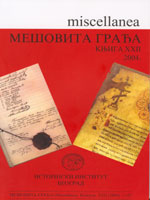Дужности особља управе Државног сточарског завода у Добричеву
Duties of the Staff of Administration of the State Cattle Breeding Institute in Dobričevo
Author(s): Gordana Garić PetrovićSubject(s): History, Pre-WW I & WW I (1900 -1919)
Published by: Istorijski institut, Beograd
Keywords: State Cattle Breeding Institute; State Stud Farm; Dobričevo; cattle breeding; agriculture; Kingdom of Serbia
Summary/Abstract: The State Stud Farm was established in 1852 in Ćuprija. In 1859 it was transferred to Požarevac and the next year to Ljubičevo. The primary aim of the Stud Farm was to improve horse breeding in Serbia through spreading noble horse breeds. The Stud Farm Department in Dobričevo was set up in 1875. Until the formation of the Ministry of National Economy, the Ministry of the Military was in charge of the State Stud Farm. The State Stud Farm, established to upgrade horse breeding in Serbia, was re-established, in 1892, under the Law on Organisation of the State Cattle Breeding Institute, into the State Cattle Breeding Institute. The aim of this transformation was to improve cattle breeding in Serbia by breeding the heads of the best cattle breeds, which were further allocated across the country to enhance the quality of domestic cattle. The administrator with the necessary number of professional staff carried out direct supervision and care about the improvement of the Institute. The administrator, headman, procurement clerk, veterinarian, accountant and registrar were appointed by the king’s decree on the proposal of the Minister of National Economy, while the assistant procurement clerks, stablemen, veterinary assistants, registrars and practitioners were appointed by the Minister of National Economy. In addition to regular officers – the manager of the estate, veterinary, accountant, procurement clerk and stable master, the estate also employed a large number of supporting staff – blacksmiths, cartwrights, overmen, gardeners, builders, heads, keepers, coachmen, assistant stablemen and drivers. Convicts performed the most difficult jobs. The Institute’s land covered 1270.32 ha and consisted of meadows, fields, arable fields and forest. Most sowed on arable fields were oats, followed by barley, wheat, corn and turnip. In addition to horses, the State Stud Farm – later the State Cattle Breeding Institute also kept various types of cattle – bovines, sheep, pigs, goats and poultry. All animals were fed manly with animal fodder produced on the Institute’s soil. The funds for salaries, building repairs, heating and lightening, and money for daily allowances were provided from the budget. At the same time, income was generated from the garden, food and crops, stud fees, cattle and cattle breeding, lease, oxen fees, boar fees and the workshop. The document prepared for press contains the provisions of the Law on Organisation of the State Cattle Breeding Institute relating to the duties of the Institute’s staff in Dobričevo. The duties were prescribed after the arrival of the new administrator dr Uroš Stajić. They define the obligations and duties of the headman, accountant, head of cattle breeding, stable master and practitioners.
Journal: Мешовита грађа
- Issue Year: 2017
- Issue No: 38
- Page Range: 111-127
- Page Count: 17
- Language: Serbian

